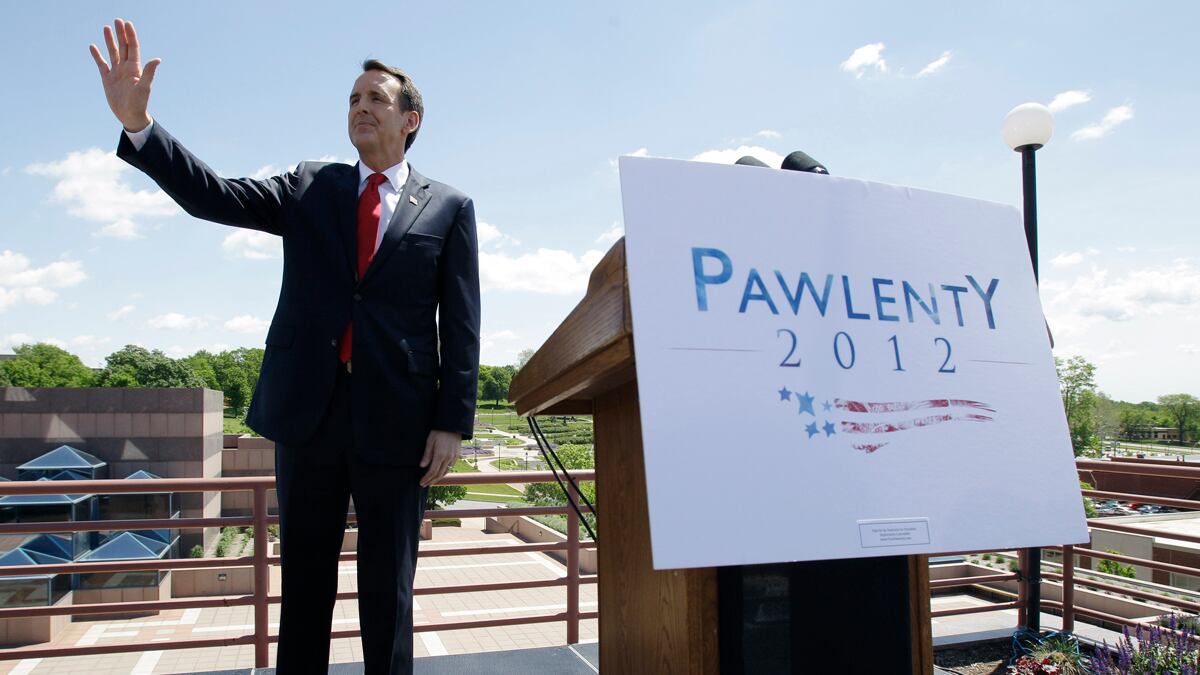Could Tim Pawlenty’s campaign for the Republican presidential nomination be over in August?
At the moment, Pawlenty is living the double life of a top-tier contender (former governor of a large state, regularly booked for national TV interviews, offering his views on the Arab Spring to the Council on Foreign Relations in New York) and a candidate on the verge of collapse (bad reviews for the first debate, bad numbers in the first Iowa Poll and bad news on the fundraising front).
Blame Minnesota. Seriously.
Being from Minnesota was supposed to give Pawlenty a potent pitch for 2012: Conservative chief executive nudges liberal state to the right and, as he says in his Iowa radio ad, “If I can do it in Minnesota, we can do it in Washington.” The connection was also supposed to give him an advantage in neighboring Iowa’s first-in-the-nation nomination contest.
Instead, Pawlenty’s hand for 2012 is getting worse and worse.
His home state has now produced a second candidate, Michele Bachmann, who inspires more passion than Pawlenty and whose connection to Iowa eclipses Pawlenty’s mere claim of living just north of it. She was born there.
The geographic proximity, meanwhile, has turned into something of a trap. Unlike Mitt Romney and Jon Huntsman, who are focusing on the New Hampshire primary, Pawlenty made the logical decision to make his first stand in the Iowa caucuses. That’s put him in a tough position.
First, he has to court Iowa’s influential Christian conservatives, who care deeply about social and religious issues. That takes time away from talking about jobs and the economy, and still doesn’t guarantee him their votes in a field that also includes Bachmann and Rick Santorum.
Second, a commitment to Iowa means a commitment to the Iowa Straw Poll, a high-risk test of the organizing skills needed to win the caucuses six months later. The Aug. 13 event has a history of ending candidacies within weeks, sometimes hours. “He needs to play and he needs to do well there,” Gentry Collins, a former national party official who ran Romney’s 2008 campaign in Iowa, says of Pawlenty.

Steve Grubbs, a former Iowa GOP chairman who was with the Steve Forbes campaign in 2000, says Pawlenty has a better organization in the state than Bachmann or another candidate with buzz, former pizza mogul Herman Cain. “Pawlenty’s biggest challenge is, he’s not creating excitement among voters. He needs to figure that out,” Grubbs says. It can be done, he adds, and TV ads will help.
Pawlenty has budgeted $1.75 million for the straw poll, according to a Republican consultant familiar with the Pawlenty campaign. That’s a major commitment, comparable to what George W. Bush and Steve Forbes spent in 1999 to place first and second ($1.1 million and $1.9 million, respectively, in today’s dollars).
The money could help, if it was there to spend. “They clearly don’t have it. So in the end I’m not sure how they’re going to implement their straw-poll strategy,” the consultant said. “I know so many of the vendors who aren’t getting paid. They are holding back so many bills.” And that’s on top of a Washington Post report last week that several aides are working without pay.
Pawlenty spokesman Alex Conant called the information about the straw poll “inaccurate,” but declined to specify if he means the campaign’s straw-poll budget or whether there’s money to back it up.
The depth of Pawlenty’s bet on Iowa is clear in the time and money he has devoted to the state. While he’s no stranger in New Hampshire, he has spent the equivalent of nearly a month in Iowa. He started running a cable-TV ad there in the middle of last week and just added a radio ad on Christian and news stations in Des Moines. The theme of both spots is “results, not rhetoric,” and the focus is on Pawlenty’s record of cutting spending, taking on unions, and naming conservative Supreme Court justices.
Unfortunately for Pawlenty, the television commercial did not start in time to affect the results of the Iowa Poll, which was in the field June 19-22. His frequent presence in the state didn’t do much good, either. He finished fifth with 6 percent, behind even Ron Paul and Newt Gingrich. Romney and Bachmann drew nearly four times that level of support.
These are not the numbers you want as you enter the last week of the second-quarter fundraising period. Within 36 hours, on the same morning Bachmann was announcing her candidacy in her birthplace of Waterloo, Pawlenty was on NBC and CBS doing damage control. First, however, he had to get past the indignity of his introduction by Today's Ann Curry. “Another Republican from Minnesota is also running for president,” she said, before asking if he were disappointed by the poll.
“No. These early polls aren’t very good predictors of how the race is going to come out,” he told Curry. “There’s plenty of time to do well in Iowa and beyond.” Pawlenty pointed out that Hillary Clinton led in early polls yet lost the Democratic nomination, while John McCain was not particularly popular with Republicans—yet became their nominee. And finally the clincher: Mike Huckabee was at 4 percent in the first Iowa Poll of 2007, and he won the caucuses.
But those analogies are flawed. Clinton’s opponent, Barack Obama, “was raising huge amounts of money. He was drawing crowds that were filling massive venues very early on,” Collins recalls. As for Huckabee, he was “the only alternative on Mitt Romney’s right” in Iowa in a year with huge evangelical turnout. “I certainly wouldn’t write Pawlenty off. He’s a strong candidate. But those aren’t good templates,” Collins says.
There are a number of straw-poll complications this year that Pawlenty would not have faced in 2007. One is the presence of not one but three candidates with energetic, enthusiastic followings—Bachmann, Paul, and Cain. All three have harnessed that support this year to win numerous straw polls.
Another problem for Pawlenty is a debate in Iowa two nights before the straw poll. Romney and Jon Huntsman are skipping the straw poll—they didn’t spend money to buy space in Ames and won’t be making speeches there—but they’ll both be at the debate and could even explicitly ask for straw-poll support. So the Republicans making their choices at the straw poll will have fresh memories of all the candidates, even those who aren’t there.
Romney in particular could show strength in absentia. He won the straw poll in 2007 and still has an organization in Iowa, though it’s smaller than it was back then. If Romney does well in the debate, he could drain from Pawlenty some of the straw-poll voters who want an experienced ex-governor to go up against President Obama.
That’s assuming Romney will be on the ballot, and he probably will be, as will Huntsman. State party officials put John McCain, Rudy Giuliani and Fred Thompson on the straw poll ballot in 2007 even though they hadn’t officially entered it. Casey Mills, a spokesman for the Iowa GOP, says he expects the party “will lean toward inclusion” of everyone again this year. A decision is due July 23.
Despite the tide of uncertainties, Pawlenty has little choice at this point but to compete hard and try to make the straw poll his comeback-kid moment. They say you can tell a lot about candidates by how they deal with setbacks. There will be plenty of those on which to judge Pawlenty by the arrival of that fateful Saturday in Ames.






